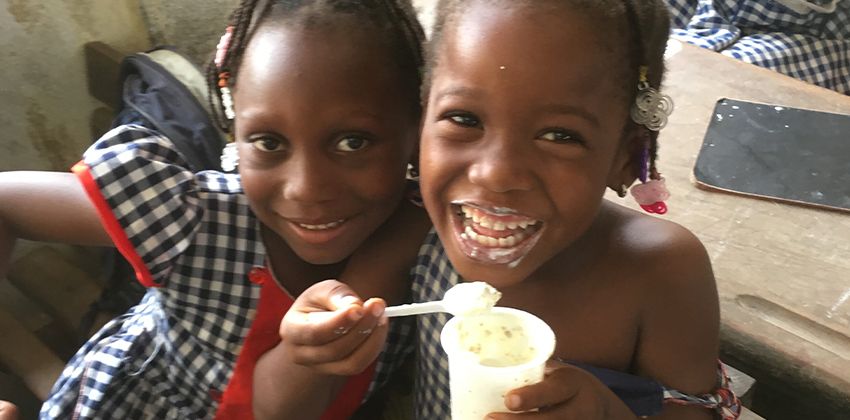Carolina de Weerth has been working with first graders through the Jacobs Foundation TRECC program in Côte d’Ivoire to determine whether an inexpensive probiotic food supplement can be linked to better cognitive functioning. Such a supplement would create an affordable and simple way to improve children’s basic conditions for learning.
Her psychobiological research focuses on how the early environment affects child development.
Thanks for speaking with us, Carolina. Could you start by explaining to us what “psychobiological” research is?
Oh, sure. We can’t just look at the mind and forget the body, because your body is influencing your mind all the time. A psychobiological view means using biology to help us understand the physical mechanisms underlying a psychological experience.
For example, I study prenatal stress. Women who report feeling stressed during pregnancy may have babies who are more easily upset and cry more. We try to understand the biological mechanism by which a mother’s worries may affect the baby in her womb.
To the layperson, an association between gut bacteria and cognitive development is not an immediate link. Why are you now studying diet?
I am looking at the impact of diet on gut microbes because gut microbes are constantly signalling to the brain. Some pregnant women who say they are stressed do not have higher stress hormones. But maybe they eat differently. For example, when you are stressed, you might eat more chocolate – or you might eat very little at all.
So stress can affect diet, and diet affects gut microbes, and these microbes send signals to the brain. I look at mind/body relationships because I think they are key to understanding child development.
You have been working with first graders through the Jacobs Foundation TRECC program in Côte d’Ivoire to see if a probiotic food supplement can be linked to better cognitive functioning in those children. What have been the most exciting aspects of this research project for you?
We plan to publish our results shortly, but in general, I can say there are two things that were really exciting. One thing was the execution of the project in terms of the number of children participating, the other was the help we got from our student assistants.
What I thought was incredible was the number of children who wanted to participate in this study. The final project sample was 251 children, once we had narrowed down the target group, so that was a very nice result. The kids were very motivated and enthusiastic so that was great too.
And our student assistants were completely fantastic. My postdoc Bonnie Brett and myself couldn’t test the kids ourselves as white people, so we hired five local PhD students as research assistants. They were absolutely great! They had not tested children before, but they trained well and were very dependable. I was impressed by the quality of their work and their motivation.
What findings can you share with us?
At the start of the project, the children took five cognitive tests. We then divided the children into three groups. One group took the probiotic supplement, one group took a non-probiotic supplement and the third group had a diet per usual. After four months, we tested them again to see whether anything had changed.
What is exciting is there was clear improvement on all five tests across the semester. The reason this is exciting is that there were six weeks of strikes during the project time when the children were not at school. And the second time we tested, despite the break from school, significantly more children could complete the tasks. So we can see the children are developing.
Were you able to establish a link between the probiotic supplement and cognitive development?
We didn’t find any effects of the supplement which is a pity. But we cannot conclude that it doesn’t help because we could not execute the study in the way that we had planned it. From the 68 possible days for consuming the probiotic, the mean days it was actually consumed was 33, because of the strike and other issues. So we did not have enough time to really see if there was a difference.
It has still been useful to do this study in an African country, as to date there are only a few studies on these innovative ideas, and most in Western countries. I am currently working with my team with some biological samples and other data from the study to see how that is related to cognition. We have a couple of research questions we plan to answer by the end of December.
Part of the project was also to create micro-enterprises to produce probiotic yoghurt in the Côte d’Ivoire cocoa communities. How is this part of the project progressing?
I am really excited about the micro-enterprises because it is a win-win-win situation. The micro-enterprises give emancipation to women because it is often women who set up the micro-enterprise, and it gives them money for their families. At the same time, they are selling a nutritive and healthy product in their communities.
The Yoba for Life Foundation makes the probiotic available for developing countries in cheap sachets. From each sachet, you can make 100 litres of probiotic yoghurt to sell. There are many publications showing the health benefits of this probiotic and Uganda is integrating the yoghurt into their school feeding programs. So we know we are supporting a good product. Together with the Yoba Foundation, who have a lot of experience in micro-enterprises, we organized a training workshop in San-Pédro in Sept 2019, with around 20 interested women. Several of these women are now producing the Yoba yoghurt locally. In Jan 2020 we held a workshop for NGO’s and cacao companies in Abidjan to introduce them to Yoba and its benefits. People were very interested and wanted to explore possibilities.
